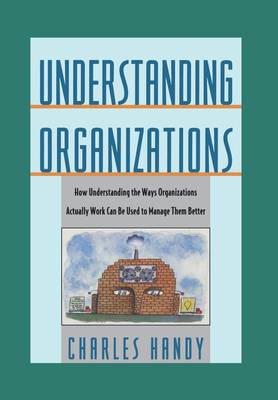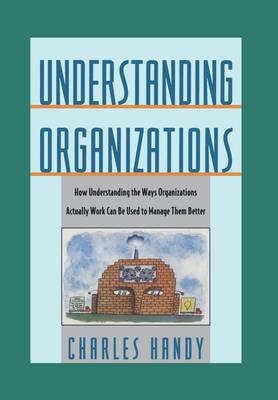
- Afhalen na 1 uur in een winkel met voorraad
- Gratis thuislevering in België vanaf € 30
- Ruim aanbod met 7 miljoen producten
- Afhalen na 1 uur in een winkel met voorraad
- Gratis thuislevering in België vanaf € 30
- Ruim aanbod met 7 miljoen producten
Zoeken
Omschrijving
Charles Handy's revolutionary 1989 bestseller The Age of Unreason catapulted him into the ranks of the top management consultants. Now, in this new edition of his acclaimed study Understanding Organizations, he solidifies his reputation as a seminal business thinker, offering a brilliantly insightful, wide-ranging look at business organizations.
Long a bestseller in the United Kingdom, this classic text offers an illuminating discussion of key concepts of concern to all managers: culture, motivation, leadership, power, role-playing and working in groups. Ever mindful of actual business practice, Handy directly addresses how managers can translate the six main concepts into invaluable tools for effective management. He discusses how all organizations need to select, develop and reward their people; to structure and design their work; to resolve political conflicts; to lay down guidelines for their managers; and to plan for the future. In each case, the approaches and techniques described here are invaluable.
Equally important, Handy excels at presenting his ideas in colorful, immediately accessible ways, filling the book with illuminating examples and inventive metaphors that range from Tolstoy's ideas on the concept of self, to the many meanings of "good morning," to the conversations that occur in a stopped elevator, to the proper size for a vineyard or an elephant. He shows, for instance, how an optical illusion experiment sheds light on interdepartmental relations, and how the way schoolchildren are typecast by their peers helps explain corporate hierarchies. And along with case studies, graphs, charts, and questionnaires, Understanding Organizations is peppered with boxed sections that offer advice and stimulate thought, brimming with provocative quotations from business wizards such as Peter Drucker, Tom Peters, Warren Bennis, Alvin Toffler, and Rosabeth Moss Kanter, as well as from Aristotle, Shakespeare, Gilbert and Sullivan, Gail Sheehy, and Joseph Heller.
What the successful manager knows intuitively, Charles Handy puts into words. His powerful interpretive schemes will help managers grasp the underlying dynamics of their company, make sense of its past, and assess--and shape--its future.
Long a bestseller in the United Kingdom, this classic text offers an illuminating discussion of key concepts of concern to all managers: culture, motivation, leadership, power, role-playing and working in groups. Ever mindful of actual business practice, Handy directly addresses how managers can translate the six main concepts into invaluable tools for effective management. He discusses how all organizations need to select, develop and reward their people; to structure and design their work; to resolve political conflicts; to lay down guidelines for their managers; and to plan for the future. In each case, the approaches and techniques described here are invaluable.
Equally important, Handy excels at presenting his ideas in colorful, immediately accessible ways, filling the book with illuminating examples and inventive metaphors that range from Tolstoy's ideas on the concept of self, to the many meanings of "good morning," to the conversations that occur in a stopped elevator, to the proper size for a vineyard or an elephant. He shows, for instance, how an optical illusion experiment sheds light on interdepartmental relations, and how the way schoolchildren are typecast by their peers helps explain corporate hierarchies. And along with case studies, graphs, charts, and questionnaires, Understanding Organizations is peppered with boxed sections that offer advice and stimulate thought, brimming with provocative quotations from business wizards such as Peter Drucker, Tom Peters, Warren Bennis, Alvin Toffler, and Rosabeth Moss Kanter, as well as from Aristotle, Shakespeare, Gilbert and Sullivan, Gail Sheehy, and Joseph Heller.
What the successful manager knows intuitively, Charles Handy puts into words. His powerful interpretive schemes will help managers grasp the underlying dynamics of their company, make sense of its past, and assess--and shape--its future.
Specificaties
Betrokkenen
- Auteur(s):
- Uitgeverij:
Inhoud
- Aantal bladzijden:
- 448
- Taal:
- Engels
Eigenschappen
- Productcode (EAN):
- 9780195087321
- Verschijningsdatum:
- 2/12/1993
- Uitvoering:
- Hardcover
- Formaat:
- Genaaid
- Afmetingen:
- 167 mm x 239 mm
- Gewicht:
- 771 g

Alleen bij Standaard Boekhandel
+ 248 punten op je klantenkaart van Standaard Boekhandel
Beoordelingen
We publiceren alleen reviews die voldoen aan de voorwaarden voor reviews. Bekijk onze voorwaarden voor reviews.











